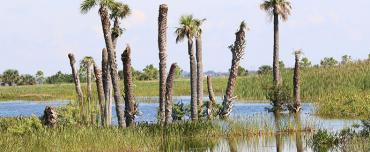
HB 521, amending the mitigation options for wetlands impacted by development projects, has just been signed into law. It means local governments will now be allowed to authorize mitigation of conservation lands they have purchased and own -- if state and federal mitigation credits are not available and financial assurances are provided by the developer for the perpetual maintenance of the land.
The Florida Association of Mitigation Bankers (FAMB) floridamitigationbanking.org said in a prepared statement it applauds DeSantis for signing the legislation. “As Florida continues to grow and welcome more residents, we must ensure our state’s wetlands are appropriately conserved. That is why we are pleased that Governor DeSantis signed HB 521 into law, which will help ensure that roads can be built in a timely manner and that housing stays affordable, while most importantly protecting Florida’s precious natural resources at the same time,” stated Joe Sicbaldi, president of FAMB.
State and federal regulations balance the need for development with Florida’s ecosystem services by requiring projects to avoid, minimize and then mitigate wetland impacts. Mitigation bank sponsors invest in restoration projects in advance of impacts and are not awarded credits unless their projects are deemed successful by the appropriate federal and state agencies. In this way, mitigation banks pay for the potential environmental impacts of development before they actually occur, thus ensuring they are in fact addressed. Mitigation banks preserve wetlands and provide financial assurances that they will be protected and maintained in perpetuity.
In some rare instances, mitigation bank credits are unavailable, and an alternative way is needed to offset impacts. HB 521 provides for that alternative.
“I am grateful Governor DeSantis signed this good legislation that will help ensure Florida can continue to meet housing and infrastructure demands to keep up with the growing population of the Sunshine State, while ensuring our unique natural resources are appropriately preserved and well maintained,” said Lawrence McClure, R-Plant City, sponsor of the House bill.
Mitigation banks are highly regulated by the federal and state government to ensure their quality and longevity. Thus, they are the preferred way to offset impacts to natural resources, claims the FAMB. The mitigation banking industry across the country includes non-governmental organizations (NGOs) like the Audubon Society, The Conservation Fund, the Environmental Defense Fund, and The Nature Conservancy, as well as private landowners.
FAMB is a group of mitigation bank sponsors, environmental consultants, and industry allies that promote Florida’s mitigation banking industry, and provides national leadership in the burgeoning field of mitigation banking. FAMB supported HB 521 as an alternative option when mitigation bank credits are unavailable.
“FAMB members are deeply committed to Florida and the communities in which they operate. They strive to provide high quality ecosystem restoration to keep Florida moving forward, economically and environmentally,” added Sicbaldi.
The organization reports that since the inception of mitigation banking, Florida’s mitigation banks have serviced 4,280 federal permits. As of May 2019, more than 180,000 acres of habitat are protected as part of the more than 100 approved mitigation banks in Florida. Another 33 or more mitigation banks encompassing 24,800 acres are currently in permitting.


